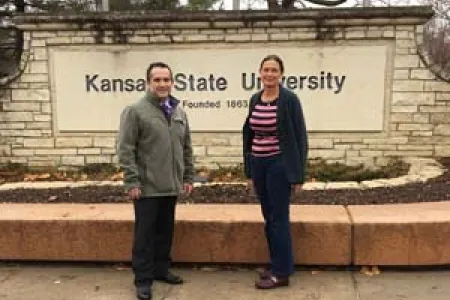Fulbright scholar brings home ideas to secure futures
A returning Fulbright scholar has likened the Northern Territory to communities in the state of Kansas in the United States, saying that with shared challenges also lay shared solutions.
Northern Institute Director Professor Ruth Wallace was the first woman to be awarded the Fulbright Distinguished Chair in Agriculture and Life Sciences Scholarship and recently concluded a six-month residency at Kansas State University.
“There are a lot of similar issues (between the NT and Kansas) such as diminishing populations, and populations where English is a second language,” Professor Wallace said.
Her research, which focuses on marginalised learners’ identities and the intersections with educational systems in regional and remote areas of Northern Australia, provided the basis for her work in the US where she contributed to the “Biosecurity Policy at the Margins Project”.
“A real highlight for me was visiting some First Nations communities to talk about how they are working within their communities and learning more about Indigenous engagement from their perspective,” she said.
Professor Wallace said community involvement and partnerships were key to the future and that her fellowship had provided an opportunity for shared cross-learning in areas of community engagement where the local universities were central to future growth.
“Kansas State University is the state’s ‘Land Grant’ university, which are institutions established in the 1800s as publicly funded agricultural and technical educational institutions to teach practical skills,” she said.
“This historical context means that today the university is central to the community, providing practical education to help individuals, businesses and communities solve problems, develop skills and build a better future.”
She said she saw opportunities where CDU could expand its community engagement to build stronger ties with industry and community to help solve issues surrounding demographics, economic development, workforce development and social policy.
“The NT is a very large region to service and CDU is still relatively young in comparison to other universities world-wide, but its research, educational programs and extension are key for the community to build solutions.
“There is a lot we can learn – from the systematic way that K-State’s research and extension areas provide links between government, community, industry and university – to make sure we’re getting the most value out of research.”
She said one of the ideas the Northern Institute hoped to trial soon was “D-labs” where the university, industry stakeholders and the community could come together for “design thinking” sessions aimed at building engagement and problem-solving networks.
Professor Wallace will give a seminar on her Fulbright experience on Thursday, 17 August at 2:30pm in building Yellow 1.2.48.
